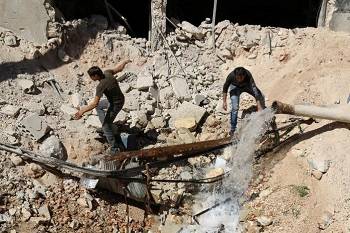Syrian regime and opposition forces battled for control of high ground on the Aleppo outskirts on Saturday as warplanes bombed the city's opposition-held east relentlessly in a Russian-backed offensive that has left Washington's Syria policy in tatters.
In their first major ground advance of the offensive, the regime army and its militia allies seized control of the Handarat Palestinian refugee camp, a few kilometers north of Aleppo, only for opposition forces to counterattack a few hours later.
"The fighters are waging ferocious battles because it is a battle of existence," a senior opposition official told Reuters.
Opposition forces said they had recovered some or all of Handarat. The Syrian Observatory for Human Rights said the battle was ongoing. There was no immediate comment from the Syrian military.
The assault on Aleppo, where more than 250,000 civilians are trapped in a besieged opposition sector, could be the biggest battle yet in a war that has killed hundreds of thousands of people and driven 11 million from their homes.
Residents say air strikes on eastern Aleppo since the offensive was announced on Thursday have been more intense than ever, using more powerful bombs. Scores of people have been killed in the last two days.
Two weeks after Moscow and Washington announced a ceasefire, Bashar al-Assad and his Russian and Iranian allies appear to have launched a campaign for a decisive battlefield victory that has buried any hope for diplomacy.
U.S. Secretary of State John Kerry, who hammered out the truce over the course of months of intensive diplomacy, was left pleading in vain this week with Russia to halt air strikes.
Opposition officials said air strikes on Saturday hit at least four areas of the opposition-held east, and they believe the strikes are mostly being carried out by Russian warplanes. Video of the blast sites shows huge craters several meters wide and deep.
"There are planes in the sky now," Ammar al Selmo, the head of the Civil Defense rescue service in the opposition-held east, told Reuters from Aleppo on Saturday morning.
The group draws on ambulance workers and volunteers who dig survivors and the dead out of the rubble, often with their bare hands. It says several of its own centers have been destroyed in the latest bombing. "Our teams are responding but are not enough to cover this amount of catastrophe," Selmo said.
The Syrian Observatory for Human Rights said at least 45 people, among them 10 children, were killed in eastern Aleppo on Saturday. Selmo put the two-day death toll at more than 200.
The regime army says it is targeting only militants.
'Monstrous Atrocity'
Damascus and its allies including Shi'ite militia from Iran, Iraq and Lebanon have encircled opposition-held areas of Aleppo gradually this year, achieving their long-held objective of fully besieging the area this summer with Russian air support.
A pro-regime Iraqi militia commander in the Aleppo area told Reuters the aim was to capture all of Aleppo within a week.
A Western diplomat said on Friday the only way for the regime to take the area quickly would be to totally destroy it in "such a monstrous atrocity that it would resonate for generations".
U.N. Secretary-General Ban Ki-moon condemned the "chilling military escalation" in Aleppo, his spokesman said on Saturday.
The United Nations Security Council is due to meet at 11 a.m. (1500 GMT) on Sunday to discuss the recent escalation of fighting in Aleppo, diplomats said.
The meeting, which will be public, was requested by the United States, Britain and France.
In a meeting on Saturday in Boston, Kerry and his counterparts from the EU, Britain, Germany, Italy and France called on Russia to "take extraordinary steps to restore the credibility of our efforts, including by halting the indiscriminate bombing by the Syrian regime of its own people, which has continually and egregiously undermined efforts to end this war."
UNICEF, the U.N. children's charity, said a pumping station providing water for opposition-held eastern Aleppo was destroyed by bombing, and the opposition forces had responded by shutting down a station supplying the rest of the city, leaving 2 million people without access to clean water.
Tarik Jasarevic, spokesman for the World Health Organization, said on Saturday the water system was working "in around 80 percent of the city - both sides".
A Syrian regime military source told Reuters its operation was continuing according to plan, but declined to give further details. The source said on Friday the operation could go on for some time.
Asked about the weapons being used, the source said the army was using precise weapons "suitable for the nature of the targets being struck, according to the type of fortifications", such as tunnels and bunkers, and "specifically command centers".
The EU foreign policy chief Federica Mogherini and Humanitarian Aid Commissioner Christos Stylianides said the Aleppo situation had "seen a dramatic and rapid deterioration".
"The human suffering being caused is an affront to the whole world. It risks to take us ever further from a negotiated settlement of the conflict, which remains the only way of bringing it to an end," they said in a joint statement.
PHOTO CAPTION
Men inspect a hole in the ground filled with water in a damaged site after airstrikes on the opposition held Tariq al-Bab neighborhood of Aleppo, Syria September 24, 2016.
REUTERS


 Home
Home Discover Islam
Discover Islam Quran Recitations
Quran Recitations Lectures
Lectures
 Fatwa
Fatwa Articles
Articles Fiqh
Fiqh E-Books
E-Books Boys & Girls
Boys & Girls  Articles
Articles










